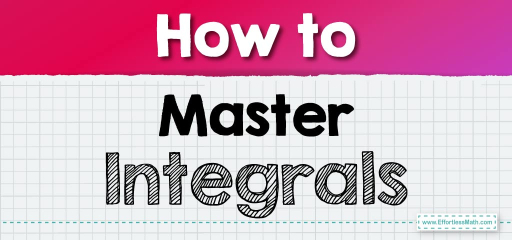How to Master Integrals
Understanding integrals is key to mastering calculus, as they provide a way to quantify accumulation, such as areas under curves or the total amount of change. Integrals are classified into two main types: definite and indefinite. Here's a step-by-step guide to understanding both.

Step-by-step Guide to Master Integrals
Here is a step-by-step guide to master integrals:
Step 1: Grasp the Concept of the Integral
The integral is a mathematical tool that allows us to sum an infinite number of infinitesimally small quantities. For functions, this typically relates to finding the area under a curve.
Step 2: Understand Indefinite Integrals
- Indefinite Integral Definition: An indefinite integral represents a family of functions that, when differentiated, give back the original function \(f(x)\). It’s often referred to as the antiderivative.
- General Notation: The indefinite integral is denoted as \(∫f(x) \ dx\), where \(dx\) signifies that the integration is with respect to \(x\).
- Result of Integration: The output is \(F(x)+C\), where \(F(x)\) is the antiderivative of \(f(x)\), and \(C\) is the constant of integration, reflecting the fact that there are infinitely many antiderivatives.
Step 3: Learn About Definite Integrals
- Definite Integral Definition: A definite integral calculates the net area between the curve \(f(x)\) and the \(x\)-axis, over the interval \([a,b]\).
- Interval Notation: It’s written as \({∫_{a}}^{b}f(x) \ dx\).
- Interpretation of Area: The area above the x-axis is positive, and the area below the \(x\)-axis is negative, so the definite integral gives you the “net” area.
Step 4: Explore the Notation
- Integral Symbol: The symbol \(∫\) is called the integral sign.
- Function: The function \(f(x)\) is the integrand, which is the function being integrated.
- dx: This indicates the variable of integration and the direction of accumulation.
Step 5: Visualizing the Integral
- Graphical Representation: For a definite integral, imagine shading the area under the curve of \(f(x)\) from \(x=a\) to \(x=b\). This shaded region represents the value of the definite integral.
- Significance: Each small shaded rectangle has a width of \(dx\) and a height of \(f(x)\), and the integral sums up all these infinitesimal rectangles.
Step 6: Calculate the Definite Integral
- Fundamental Theorem of Calculus: This theorem connects the definite integral with the antiderivative. It states that if \(F(x)\) is an antiderivative of \(f(x)\), then \({∫_{a}}^{b}f(x) \ dx\)\(=F(b)−F(a)\).
- Evaluating: Compute \(F(x)\) for both \(b\) and \(a\), and subtract the latter from the former.
Step 7: Compute Indefinite Integrals
- Technique: Use antiderivative rules, like power rules, substitution, or integration by parts, to find \(F(x)\).
- Add Constant of Integration: Always include \(+C\) at the end of your solution to signify the family of solutions.
Step 8: Understand Properties of Integrals
- Integrals are linear: \(∫(af(x)+bg(x)) \ dx=a∫f(x) \ dx+b∫g(x) \ dx\), where \(a\) and \(b\) are constants.
- The integral of \(0\): \(∫0 \ dx=C\), because the antiderivative of zero is a constant.
Step 9: Practice Problems
- Apply Your Knowledge: Practice with various functions and intervals to solidify your understanding of both definite and indefinite integrals.
By working through these steps, you’ll gain a foundational understanding of both definite and indefinite integrals. Whether you’re computing the area under a curve, the accumulation of a physical quantity, or solving complex differential equations, the concepts of integration are essential tools in both mathematics and applied sciences.
Related to This Article
More math articles
- Count Vertices, Edges, and Faces
- Best Cheap Laptops for Online Teachers: Top Picks
- 4th Grade GMAS Math Worksheets: FREE & Printable
- 7th Grade GMAS Math Worksheets: FREE & Printable
- 5th Grade TNReady Math Worksheets: FREE & Printable
- Geometry Puzzle – Challenge 71
- Decimals Demystified: From Standard Form to Expanded Form with Fractions
- How to Distance Teach Math with a Drawing Pad?
- 5th Grade MAP Math Worksheets: FREE & Printable
- 8th Grade PSSA Math FREE Sample Practice Questions





























What people say about "How to Master Integrals - Effortless Math: We Help Students Learn to LOVE Mathematics"?
No one replied yet.